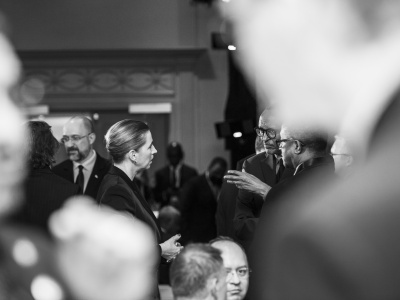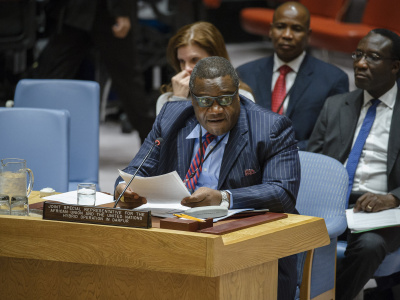
Carving out Africa’s role in the emerging global order
Authors
On 9 September 2023, the African Union (AU) was admitted as a permanent member of the G20, just weeks after the BRICS association welcomed Egypt and Ethiopia as new members, alongside Saudi Arabia, Iran, the United Arab Emirates and Argentina. Both events signal Africa's strategic repositioning. But what drives this repositioning, what are its implications for global governance, and how will the state of affairs in Africa affect it?
African states – individually or as a collective – have been more assertive in defending their interests and demanding fairer representation in global fora and multilateral institutions. Africa is increasingly seen as a strategic actor, and traditional and emerging global powers are taking note. Many of them are revising their partnership strategies. The number of Africa summits and high-level official visits have increased in the past few years. Africa's repositioning not only changes the power dynamic between it and its partners, but also alters the politics, principles and procedures of global governance.
Drivers of Africa's repositioning
Africa's growing global significance has largely been interpreted through the prism of geopolitical competition. In Europe, the discourse is often fixated on challenging or even curtailing the growing influence of the ‘other’, especially China and Russia, while coming up with an 'offer' and strategy that charms African countries and charters a new way of doing business.
The changing global geopolitical context, the need for alliances and the rush for critical minerals have enhanced Africa's global significance. But Africa's recognition as a strategic partner is equally driven by endogenous factors such as economic growth, population growth, assertive political leadership and a young digitised population that can challenge archaic narratives about the continent.
The changing global geopolitical context, the need for alliances and the rush for critical minerals have enhanced Africa's global significance.
At the start of the century, a few of the fastest-growing economies were in Africa. The continent has a fast-growing and young population, and Africans are projected to make up almost 20% of the global population by 2030. Africa's changing demography – with a growing middle class and a high urbanisation rate – can be a potential driver of global growth and prosperity if managed well. This potential has contributed to the emergence of an 'Africa rising' narrative, which was further pushed and shaped by African leaders.
Within Africa, the political and socio-economic changes of the past two decades ignited a growing sense of pride, assertiveness and continental envisioning for 'Africa's renaissance'. The continental leadership then – from the likes of Thabo Mbeki, Meles Zenawi and Olusegun Obasanjo – was able to set continental agendas and build institutions such as the African Peer Review Mechanism and AU development agency NEPAD (now AUDA-NEPAD). While the drive was to exercise agency and devise 'African solutions for African problems', these leaders were also proactive externally and contributed to global debates on international development, global finance, democracy, and peace and security.
The changing continental and global discourse on Africa's agency was also driven by a more interconnected African population, which could share African art, culture, innovation and entertainment with a global audience. As internet connectivity and access to smartphones improved, citizens could share their lived experiences, nuance international media coverage on Africa and challenge single narratives about Africa as the 'dark continent' or 'land of safaris'.
Moreover, Africans could also have their say on global issues. The increasing number of African public servants serving and leading international organisations such as the World Health Organization or the World Trade Organization also normalises the idea of Africa as a global player and Africans as global citizens.
These developments contribute to a paradigm shift in Africa's global image – from African countries as spectators to global participants with their own interests and contributions.
The increasing number of African public servants serving and leading international organisations also normalises the idea of Africa as a global player and Africans as global citizens.
Implications for global governance
Analysis of Africa's growing assertiveness often focuses on the continent’s demand for more representation in decision-making processes that affect it directly. While that is indeed one aspect of Africa's global agenda, the ambition is to have a say on global matters and be a contributing author to the emerging global order.
African countries are already making their mark on the framing and management of global challenges. During the COVID-19 pandemic, African states pushed the agenda of equitable distribution of vaccines through the Covax facility. While the facility did not result in the intended outcomes, they have continued the fight for equity by pushing for reform of World Trade Organization regulations on intellectual property rights for life-saving medicines.
Similarly, African states and climate negotiators – with others in the developing world – challenged the initial framing of climate change as a purely environmental problem. They pushed for the introduction of concepts like climate justice and common but differentiated responsibilities to ensure equity and effectiveness in climate mitigation and adaptation efforts.
In addition, African countries have called for the reform of existing multilateral institutions. They have put forth suggestions on how to reform the global financial architecture to ensure access to more and better capital and credit, and to make existing multilateral systems work better for all. African states continue to push for the reform of the United Nations Security Council (UNSC), not least by adding two permanent seats for Africa.
Reforming these multilateral institutions will take time and requires a concerted and sustained push by African states and other regions. But if achieved in some shape or form, the reform of these global fora will have far-reaching effects beyond Africa and its international standing. It will, for example, change the power dynamic and calculus behind UNSC decisions.
The reform of these global fora will have far-reaching effects beyond Africa and its international standing.
In the meantime, African countries are seeking alternative spaces and opportunities for a global role. These include issuing common African positions, taking co-pen holdership roles in the UNSC through non-permanent African states, diversifying partnerships, and joining alternative fora such as the G20 and the BRICS group. The latter is particularly attractive in terms of alliance building and the possibility of conducting international trade and politics through alternative procedures and rules.
Emerging opportunities and limitations
In the short to medium term, a few continental and global trends will influence the trajectory of Africa's global ascent.
One factor is whether the current momentum for multilateral reform yields results. The COVID-19 pandemic and the war in Ukraine have exposed the ineffectiveness of existing multilateral institutions in dealing with the world's pressing issues. The global multilateral system and its key institutions have also come under greater scrutiny for their lack of representation of the global majority.
This has rekindled a global discourse – this time around also in the West – on reforming multilateral institutions. Such a reform agenda – if followed through and influenced by African countries – can have a progressive impact on Africa's repositioning. But a more profound shift and a (new) multilateral system that is reflective of the changing global order will likely take time.
Another factor is the extent to which African states can proactively carve out a role in the emerging global order. While African states – as a collective – carry out global diplomacy on an issue basis, they need to envision ways of shaping the very rules and politics behind global governance. This would allow for a more long-term and strategic engagement at the global level, while incentivising innovative thinking on how to create – and not just seize – opportunities.
African countries have diverse interests and the AU has a limited international mandate, which presents some challenges to such a joint endeavour. In the short to medium term, countries will likely pursue much of their international engagement independently or by forming 'coalitions of the willing' based on shared interests. But even then, many stand to benefit from revising and devising new partnership strategies with major players at the bilateral level. How the AU fares in the G20 may also be an opportunity to (re)assess its international role.
The current state of affairs within the continent is another – and perhaps even more debilitating – challenge. Growing insecurity in some pockets of the continent, such as the Sahel and the Horn of Africa, lack of accountable governance in many states, youth unemployment and economic hardships that many countries are experiencing are worrying trends.
These domestic problems have also contributed to the dearth of active continental leadership that can resolve continental problems and bolster Africa’s global representation. Compared to two decades ago, more states, including 'swing states’ with continental clouts such as Nigeria, Ethiopia, Algeria and South Africa, are struggling with insurgencies, internal conflict, political crises and economic downturns – forcing their leaders to focus on domestic matters.
As Africa's global significance grows, a number of questions therefore remain. Will Africa’s global role be realised to its full potential? If so, how, and what are the preconditions? How will the rest of the world react to these changes? And more importantly, what will it mean for the lived realities of African citizens?
The views are those of the author and not necessarily those of ECDPM.






